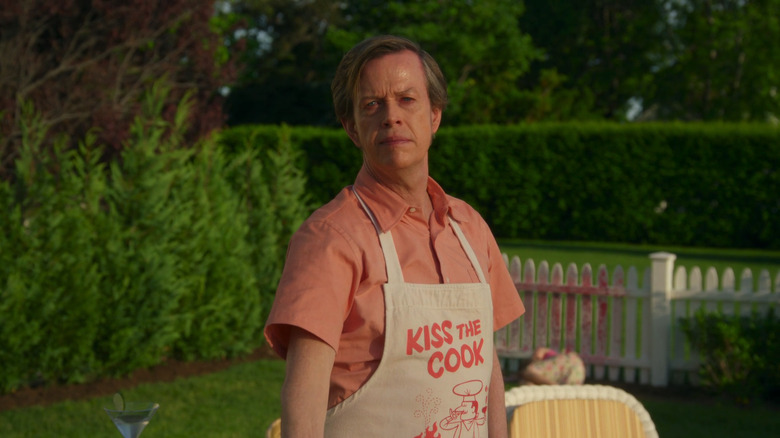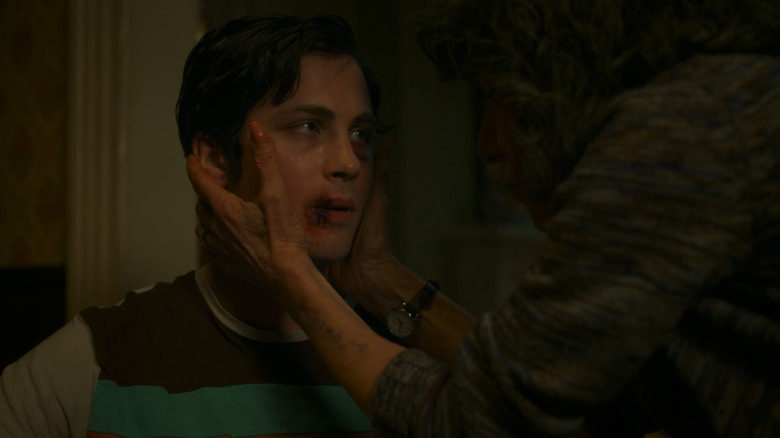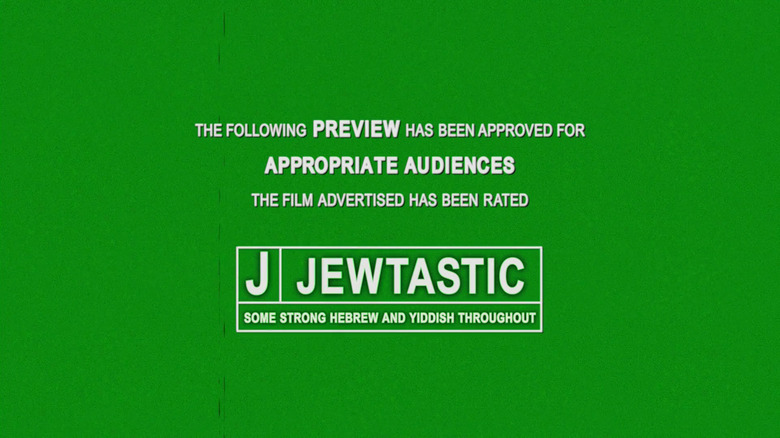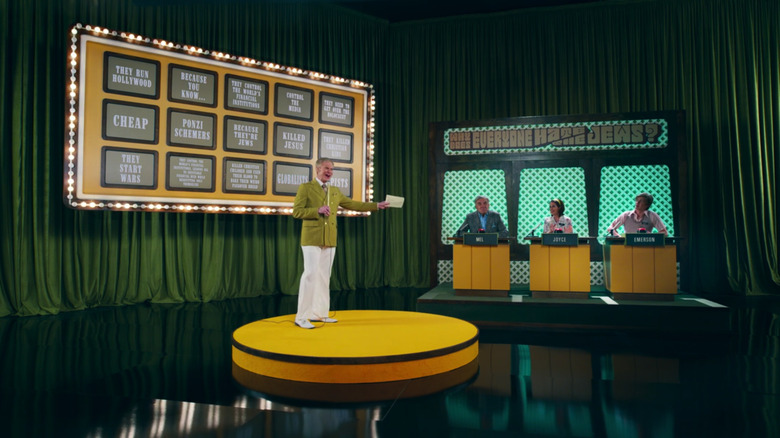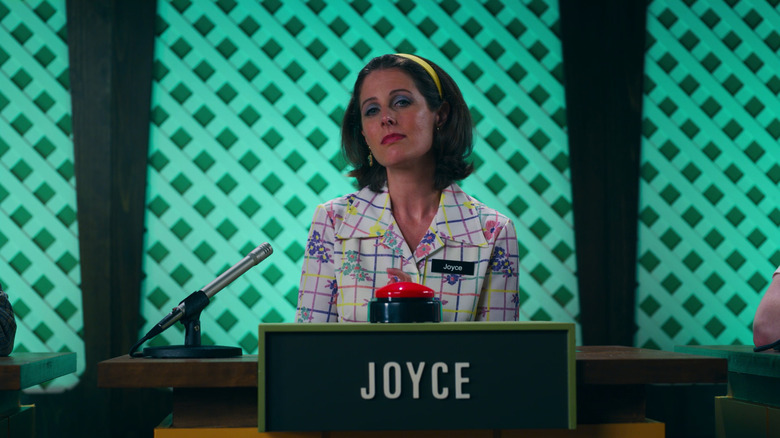One Of The Scariest Scenes In Hunters Proves That Horror Is Subjective
(Welcome to Scariest Scene Ever, a column dedicated to the most pulse-pounding moments in horror with your tour guides, horror experts Matt Donato and Ariel Fisher. In this edition, Ariel explains why this particular scene in "Hunters" is actually terrifying, and Matt provides an outsider's perspective.)
The notion of horror and what scares us is wholly subjective. Despite the occasional protestations that may suggest otherwise, there are many different ways to qualify in the genre. Whether it's partaking in the supernatural by way of "The Exorcist," "Paranormal Activity," and "The Changeling," reality-based slashers like "Scream" or "Halloween," or the chilling exploitation vibes of "Henry: Portrait of a Serial Killer," "Maniac," and "I Spit On Your Grave," different things scare different folks. Many exploitation films fall under the horror umbrella for a reason, whether their purpose is to prod at people's most taboo fears a la "Human Centipede" or to upset certain power dynamics rendering the horrific absurd as with "Ilsa: She Wolf of the SS."
Enter "Hunters," Amazon Prime's Jewsploitation series from creator David Weil, showrunner Nikki Toscano, and executive producer Jordan Peele.
Is it straight horror? Absolutely not. Is the series shot like an exploitation film from the '70s? Hell yes. But most importantly, does it manage to be downright horrifying? 100%, yes.
Again, I reiterate that horror and what we consider to be horrifying are highly subjective. Reactions to popular horror movies vary wildly all the time — I know I don't need to remind you of all the (predominantly white) people who scoffed and said "Get Out" didn't qualify as horror because it just wasn't that scary. The moral of that story is that it doesn't have to be terrifying to you to be scary at all.
"Hunters" terrified me. It also moved me immeasurably, offering a kind of representation I'd never seen before. I'll likely write about multiple scenes in the series' first season at some point throughout this column, but today I'm going to start with the one that left me a shivering, sobbing mess, and it's just a cutaway scene.
The setup
Set in 1977 New York, "Hunters" is a story of revenge. After the cold-blooded murder of his Safta, Ruth (Jeannie Berlin), Jonah Heidelbaum (Logan Lerman) seeks answers and retribution, finding nothing but indifference and dead ends instead. Until he meets Meyer Offerman (Al Pacino) at his Safta's shiva, who introduces him to the titular Hunters — a uniquely diverse group of Nazi hunters working together to find and kill SS officers hiding in America.
The story so far
One of the most terrifying aspects of the series is its deep roots in historical facts. Nazis fled or evaded capture, and either hid or were given sanctuary. Operation Paperclip was a covert initiative from the U.S. government that smuggled Nazi German scientists into America to help them with the Cold War. They protected them, gave them new lives and jobs, rewarding them for their crimes against humanity to help their own government.
Nazi hunters also existed in real life, though not exactly the way the show portrays them. That said, one of history's most famous Nazi hunters does make an appearance, condemning their violent behavior — Simon Wiesenthal (played by Judd Hirsch).
Naturally, our titular Hunters spend a great deal of time tracking various Nazis hiding in plain sight. Through them, the show directly confronts the world's indifference towards antisemitism even a mere 32 years after the end of WWII and the Holocaust, echoing its present-day callousness.
The scene in question takes place in the eighth episode, "The Jewish Problem." Part of hunting the Nazis that evaded capture or have been actively protected includes thwarting their plan to start a Fourth Reich, fulfilling Hitler's Aryan dream. And now, the Hunters know how they plan to do it: a nearly undetectable pathogen that lays dormant for six days until it eviscerates its host seemingly out of nowhere. They're going to target low-income neighborhoods in order to eradicate as many "undesirables" as possible from all walks of life that aren't "pure" by Aryan standards.
The scene
While discussing the infamous "Rocket Man," Wernher Von Braun. "He was a genius," Meyer Offerman says when Jonah asks who he is. What follows is all 100% true, as they take turns describing the Nazi-turned-NASA scientist's horrific legacy and his work on America's space program, something historians still can't quite reckon with. That NASA link, incidentally, talks about Von Braun's "lifelong dreams" and the Encyclopedia Britannica doesn't mention his use of Jewish slave labor or the Nazis once. Just to give you a sense of how human life was qualified against the value of Nazi science.
He was beloved, and everyone lauded him. "Moon Man was more beloved than, if you can believe this, me," quips Lonny Flash (Josh Radnor). "Graced the cover of TIME, starred in Disney's TV shows. All of America f***ing loved the guy."
"I don't understand," Jonah says in utter disbelief. "He's a nazi."
"Jonah," Meyer interjects with a dejected smirk. "Who do the Nazis kill? Jews. The majority of this country, or any for that matter, couldn't care less."
Enter the cutscene, a "Family Feud"-style game show called "Why Does Everyone Hate The Jews?"
What follows is a relentless, rapid-fire onslaught of some of the most popular and insidious tropes and stereotypes about Jewish people:
-
They control the world's financial institutions (because once is never enough when it comes to antisemitic tropes)
-
Killed Christian children and used their blood to bake their weird Passover bread
"Joyce wins big money tonight, folks," proclaims the show's host. "Congratulations, Joyce! Game well played!"
"Do you know someone who would win big money here? Have them apply today," he continues with a perfect grin. "No, really," he says again, his tone shifting, "do you?"
The textbook 1970s gameshow music changes like a record losing momentum, warbling and wobbling to a terrifying and unsettling stop. "Maybe a parent? A friend? Your husband or wife?" Slowly, the contestants' faces change, their expression shifting to a deadpan, knowing stare directly into the camera. "Maybe they play it often. Around the kitchen table or at work." It's quiet now, nothing but the host's knowing, seemingly harmless words penetrating the deafening silence. "Maybe just in the safety of their own minds because they still believe that Jews ... just aren't us. How often do they play this game? Would they win big money here? Would you?"
When I first watched this scene, after eight episodes of truly terrifying material, I had to pause the show and catch my breath. I couldn't stop crying or shaking. The scene relies on the fact that the world hates us, considers us subhuman, or is just completely indifferent to us despite literal centuries of persecution that predate Jesus Christ himself. It's something many (if not most) of us are raised to be aware of. How to play nice, make ourselves small or innocuous, get along with as many people as possible, how to hide, how to pass, all because you never know who hates you or wants you dead.
Sadly, I'm not being hyperbolic.
This scene still gives me chills, and for good reason.
So, do you know someone who could win big money on that show? Would you?
The impact (Matt's take)
It's not as important to provide context as an outsider here, because this isn't about some paranormal jump scare or zombie horde attack. What's truly horrifying about "Hunters" is something I, a lax Christian, will never fully comprehend. The Jewish experience didn't exist in my household, and barely in my immediate childhood environment, a suburban microcosm of homogeneity. This certainly isn't the place where I tell Ariel the "Family Feud" sequence is "funnier than it is traumatizing," that s for damn sure.
"Genre" is at its best when forcing audiences to confront uncomfortable or ignored truths. That's horror, exploitation, even superhero cinema. "Hunters" is a swankier and slicker Jewsploitation vessel, but that's a description from someone who's never had to worry about others seeing their identity as lesser. There's more to these types of underrepresented stories if viewers are paying attention, much like how white audiences can learn from Jordan Peele's horror films or American viewers can comprehend international fears through overseas titles.
Antisemitism fuels "Hunters" in a way that's informative to me, and all-too-real for Ariel. Both can be true, but there has to be that acknowledgment from the side of those who don't have first-hand experiences.
If "Hunters" is taking time to publicize the vileness of Nazis for the billionth time, it's probably for a reason. When Jewish people admit their fears and confirm unrest still exists, that's also probably for a reason. It takes zero effort to listen. That's what it comes down to. You can continue engaging with film and television as entertainment while acknowledging the culturally anxious messages behind your favorite horrors or action romps. No one's robbing your "fun," I promise.
